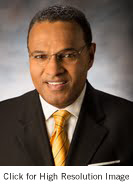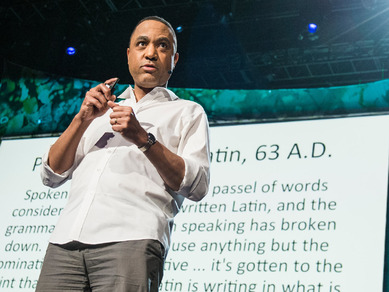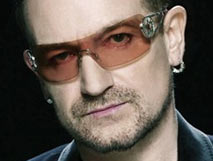TED is an organization devoted to Ideas Worth Spreading, mainly through the free distribution of 8-to-18-minute TED Talks - originally about technology, entertainment and design, but now TED covers heftier global topics such as climate change, poverty and education reform. TED hosts hundreds of events around the world but the main event is an annual invitation-only conference that attracts the most accomplished scientists, academics, politicians, writers, artists, inventors, entrepreneurs and entertainers.
TED 2013, which took place last week in Long Beach, CA, was my eighth TED. My best TED moments were conversations with Julia Sweeney, Michael Shermer, Sam Harris, Jill Bolte Taylor and Amanda Palmer.
As in prior years I have ranked the TED Talks below so that you can quickly decide which ones to watch. If you disagree with my rankings, please comment! For those of you who have pointed out my tardiness in publishing this year's list, I apologize. On the bright side, my review is so late that many of the talks are already available to watch on TED.com as you read this, so I have linked to those talks below.
This year the TED staff followed a new process for selecting TED speakers. Rather than simply invite interesting people, they attended TEDx events and selected the best speakers from those. The result was a set of TED Talks that were consistently more engaging and entertaining than in all prior years (especially compared to last year). The only downside is that fewer talks conveyed novel and important news or developments - many offered more form than substance.
So here are almost all of this year's TED Talks in order from best to worst (measured by TED Balloons even though the giant TED Balloon was mysteriously missing this year):
10 TED Balloons

Anas Aremeyaw Anas This undercover journalist exposes horrible crimes in Africa, by inserting himself into prisons, hospitals, and other hotspots of abuse. He has exposed enough powerful bad guys that he had to wear a mask on the TED stage.
 Lawrence Lessig
Lessig is such a strong, experienced lecturer that he has an unfair advantage being compared to other speakers! Lessig's talk on the need for legislative reform in Washington is riveting and compelling.
Lawrence Lessig
Lessig is such a strong, experienced lecturer that he has an unfair advantage being compared to other speakers! Lessig's talk on the need for legislative reform in Washington is riveting and compelling.
Jack Andraka 15 years old, Jack invented a fast $3 method to detect pancreatic cancer, at a Johns Hopkins lab. He won the Intel Science Fair so I'm presuming it's real!
John McWhorter This linguist presents a compelling argument on why we should all stop worrying about the decay of English skills among texting teenagers. He reviews the successful adaptation of language to other technologies, and considers how English still evolves today.
Eleanor Longden Diagnosed with schizophrenia, Eleanor's life was "shattered" with medical treatments, discrimination and isolation. But Eleanor overcame the terror, talked to the voices, and began to understand them. She still hears the voices (even during her TED Talk), but she feels recovered, working as a psychologist herself and counseling people who hear voices.
 Adam Spencer
Adam shares his enthusiasm for numbers. With lots of self-effacing nerd humor, he gets the audience laughing about math!
Adam Spencer
Adam shares his enthusiasm for numbers. With lots of self-effacing nerd humor, he gets the audience laughing about math!
9 TED Balloons
Hyonseo Lee A South Korean activist tells the story of her family's escape from North Korea.

TED 2013, which took place last week in Long Beach, CA, was my eighth TED. My best TED moments were conversations with Julia Sweeney, Michael Shermer, Sam Harris, Jill Bolte Taylor and Amanda Palmer.
As in prior years I have ranked the TED Talks below so that you can quickly decide which ones to watch. If you disagree with my rankings, please comment! For those of you who have pointed out my tardiness in publishing this year's list, I apologize. On the bright side, my review is so late that many of the talks are already available to watch on TED.com as you read this, so I have linked to those talks below.
This year the TED staff followed a new process for selecting TED speakers. Rather than simply invite interesting people, they attended TEDx events and selected the best speakers from those. The result was a set of TED Talks that were consistently more engaging and entertaining than in all prior years (especially compared to last year). The only downside is that fewer talks conveyed novel and important news or developments - many offered more form than substance.
So here are almost all of this year's TED Talks in order from best to worst (measured by TED Balloons even though the giant TED Balloon was mysteriously missing this year):
10 TED Balloons

Anas Aremeyaw Anas This undercover journalist exposes horrible crimes in Africa, by inserting himself into prisons, hospitals, and other hotspots of abuse. He has exposed enough powerful bad guys that he had to wear a mask on the TED stage.
 Lawrence Lessig
Lessig is such a strong, experienced lecturer that he has an unfair advantage being compared to other speakers! Lessig's talk on the need for legislative reform in Washington is riveting and compelling.
Lawrence Lessig
Lessig is such a strong, experienced lecturer that he has an unfair advantage being compared to other speakers! Lessig's talk on the need for legislative reform in Washington is riveting and compelling.
Jack Andraka 15 years old, Jack invented a fast $3 method to detect pancreatic cancer, at a Johns Hopkins lab. He won the Intel Science Fair so I'm presuming it's real!
John McWhorter This linguist presents a compelling argument on why we should all stop worrying about the decay of English skills among texting teenagers. He reviews the successful adaptation of language to other technologies, and considers how English still evolves today.
Eleanor Longden Diagnosed with schizophrenia, Eleanor's life was "shattered" with medical treatments, discrimination and isolation. But Eleanor overcame the terror, talked to the voices, and began to understand them. She still hears the voices (even during her TED Talk), but she feels recovered, working as a psychologist herself and counseling people who hear voices.
 Adam Spencer
Adam shares his enthusiasm for numbers. With lots of self-effacing nerd humor, he gets the audience laughing about math!
Adam Spencer
Adam shares his enthusiasm for numbers. With lots of self-effacing nerd humor, he gets the audience laughing about math!
9 TED Balloons
Hyonseo Lee A South Korean activist tells the story of her family's escape from North Korea.

Elon Musk interview
Elon needs no introduction from me. What a hero, and humble, too.
Taylor Wilson At 14 he produced fusion, and now he's a Peter Thiel fellow. Taylor came to tell us about his new inventions. This talk is especially inspiring for teens.
Phil Hansen
This talk is a great life lesson from an artist who had to leave his comfort zone when his hand developed a shake. He embraced the challenge, and even set new limitations on himself to see how he might embrace those as well! For example, what if he could paint only on his own body, or use less than a dollar of supplies, or be forced to destroy whatever he creates?
 Freeman Hrabowski
Freeman Hrabowski
Freeman, President of the University of Maryland, has a mission to help underprivileged minority students graduate in the sciences. His talk has no real point, but it's stirring and entertaining, with some good stories from his days with Martin Luther King Jr.
"Plant some shit," is the message of this South Central resident. Frustrated with the lack of fresh produce in this low-income part of LA County, Ron began a movement to plant fruit and vegetable gardens on the small grassy areas between sidewalks and streets. First he had to get the police off his back, but now his phone rings off the (proverbial) hook as neighborhoods everywhere want to emulate it. Coincidentally I happened to brunch with Ron at a mutual friend's house two weeks after TED, and he is a riot.
Stuart Firestein
Chairman of the Biology Department at Columbia spoke on Ignorance. As Maxwell said, "Thoroughly conscious ignorance is the prelude to every advance in science." There were 1.5m scientific papers published last year - 3 per minute. Every answer we find raises 10 questions, and so our ignorance expands! This talk was intelligent and entertaining, even if it did lack any real practical point.
Ajit Narayanan
Ajit describes an impressive system for language translation.
The singer-songwriter tells a great story of a Wesleyan coed turned rocker and describes her unusually personal relationship with her fans.
A famous environmentalist explains how he and some others are preserving DNA of extinct species in order to one day to restore those animals to Earth, "undoing harm that humans have caused in the past." He expects the Passenger Pigeon to be their first return guest. (Really?)
This Beijing-based artist is now known as The Invisible Man for his series of politically motivated paintings in which he disappears into various backgrounds.
I normally don't rate the 3-minute audience talks, but this one was great. According to some studies ragarding back pain and heart disease, sitting is the new smoking. So Nilofer adopted "walking meetings" in her job. I have since adopted this practice myself; I love it, as do my meeting guests.
Watch this very funny presentation on how this duck expert won an Ignobel Prize. Warning: includes homosexual animal necrophilia!
Dan makes a compelling case that philanthropies would be far more beneficial if they set aside their obsession with efficiency. Just as for-profits do, charities should be willing to spend money to attract the best and brightest people, and to market their mission to donors.
Edith gives a great account of how she and two others got the first video ever of giant deep sea squid. Attract the animals - dont scare them.
Beardyman, Champion Beatboxer.
If TED posts this talk, watch the first five minutes (it's amazing) and skip the rest.
If TED posts this talk, watch the first five minutes (it's amazing) and skip the rest.
BLACK is the world champion at Yo-yo, which he has now elevated to a performance art.
Miranda Wans and Jeanny Yao
Continuing the theme of teenage inventors, these girls presented their science fair project on how they found bacteria that can break down plastic garbage.
Lisa gives a fun talk on how books have helped her throughout life.
How can we best help our fellow human beings? Princeton Ethics Professor thinks analytically about this question, challenging us to step up our contributions.
Erik Brynjolfsson, MIT Professor
Also when economists measure economic growth, they miss a lot of economic value, such as the $300 billion of free internet content. Incorporating those gains indicates a higher standard of living.
But it's not all sunshine and rose. The tech boom does displace a lot of jobs, so people have to embrace the tech changes and adapt to it.
Later on Erik and I debated as to whether the tech boom of the last decade will ultimately be a net creator or detractor of jobs. Erik says detractor.
Denise Herzing
Denise is the Jane Goodall of Dolphin studies. She studies these self-aware, tool-wileding animals who, next to humans, have the highest ratio of brain-to-body volume.
Rodney presented Baxter, a safe friendly industrial robot. Rather than build cold robots that displace people, he believes robots need to be easy, safe and friendly so that workers and consumers embrace them in every part of their home and work life. Baxter is porgrammable simply by moving his arms around as you want him to do.
James Lyne
The founder of Sophos surveys today's cybersecurity threats.
Meg Jay, therapist
Meg counsels 20-somethings to take life more seriously - not to waste away their decade. (This is the Republican counterpart to Steve Jobs' advice to explore, not worry.) Bad advice, but well delivered!
Meg counsels 20-somethings to take life more seriously - not to waste away their decade. (This is the Republican counterpart to Steve Jobs' advice to explore, not worry.) Bad advice, but well delivered!
Disappointing talk by an impressive scientist/engineer/author/inventor.
Alex Laskey
The CEO of Opower gave a well delivered talk. He reported that the best way to get utility customers to conserve energy is to show them how they compare to their neighbors.
Fun story of a boy's fascination's with bows and arrows.
Allan discovered that despite common knowledge, animal grazing actually prevents desertification.
Orly Wahba
Orly passes out cards to people reminding them to be kind.
Leyla Acaroglu
Better design can promote conservation.
Neil Gershenfeld, Peter Gabriel, Vint Cerf
This all-star team hopes to extend the internet to species beyond human beings, and not just terrestrial species! Their videos of animals "using the internet" were not compelling.
Celebrated the progress being made in fighting extreme poverty in the world. He promised to give a fact based talk but there was a lot of literal hand-waving and aimless rambling.
Lesley Perkes
Lesley perpetrates a hybrid of art and vandalism in Johannesburg.
This reputable professor came to argue that the secular pattern of economic growth is over, but his presentation was surprisingly lame.
Gordon observed that we saw big advances in the twentieth century due to electricity, plumbing and computers. But now there doesn't seem to be anything on the horizon to drive as much growth in the standard of living and economic growth. He echoed the patent officer who in 1899 declared that everything that can be invented has already been invented, and Lord Kalvin who deemed it impossible to ever again make discoveries in physics. His evidence that innovation is done is that he himself can't figure out what those innovations will be!
Gordon argued that the long term 2% growth rate will be diminished by headwinds of debt and inequality. As if there were never any headwinds in the past, such as war, disease, inequality and recession!
Gordon piled on with ridiculous, grumpy Grandpa comments, like "How does Twitter help an unemployed auto worker?" and "How can there be progress when airplanes go no faster today than they did in the 70's?"
Photojournalist showed stunning photos of human suffering, then told how he restored the rainforest to his family land in Brazil, planting 2 million trees. After, his photo journalism became much more upbeat, showing the success of local species including humans.
Michael Green
Michael thinks wooden skyscrapers would be ecologically better than steel, and not fall down, go boom.
Jinsop Lee
Jinsop is an industrial designer who believes that you can improve customer satisfaction by incorporating more senses into every product experience.
Saki Mafundikwa
Saki opened a school of graphics art design in Zimbabwe.
Kate Stone
Kate presents the extraordinary invention of interactive paper. Would have been interesting in 1998.
2 TED Balloons
Yu presents photos of her sculptures and interior designs, telling us how beautiful they are. "Wouldn't everyone want this?" Well, no.
Wang Li
Performs "music" on a ukeke and a calabash.
Saskia Sassen
Saskia talks about city development.
























This is cool!
ReplyDelete